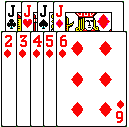| Tonk card game:
Other Games (Main Index) Game summary, how to play Tonk (tunk) is a card game played with a standard 52-card poker deck with a minimum of two and a maximum of five players. It is an enjoyable card game that is both fast-paced and strategic. Tonk, also known as Tunk is a kind of knock rummy played in the USA. There are numerous variations, and there are players who believe that their way of playing is the only correct one. So, before starting a game of Tonk with new players, it is recommended to agree first what House rules are in force. Tonk is usually played for money. Before beginning, the players should agree on the basic stake (the amount which the winner will be paid by each of the other players). In certain cases the winner can win a double stake, which is generally known as a Tonk. How to play Tonk Cards have the following assigned value * Picture cards = 10 * Aces = 1 * All others = Face Value. The object of Tonk is to minimize the total count of cards in your hand by laying down on the table Spreads of three or four equal ranked cards or Spreads of three or more consecutive cards of the same suit. Players can also reduce the value of their hand count by adding cards to other player’s previously laid down Spreads (referred to as 'Hitting' another player’s Spread). There are two types of Spreads: * A Book consists of three or four cards of the same rank, such as 6-6-6 or J-J-J-J. * A Run consists of three or more (up to 13) consecutive cards of the same suit, such as A-2-3-4-5-6 or 10-J-K. The Ace counts as low, next to the 'Two' and not next to the 'King' (although other game rules variants may allow this).
Five cards are dealt to each player, clockwise, one at a time. The next card is placed face up on the table to start the discard pile, and the remaining un-dealt cards are placed face down in a stack beside the discard pile to form a stock and used as a draw deck. At the start of play before drawing cards, a player who is dealt a point-total of 50 or 49 can immediately call Tonk and win the game immediately. Players who Tonk with 50 receive double their original bet from each player. If more than one player has 49 or 50, the hand is a draw - there are no payments, the cards are thrown in and the next player deals. If no one Tonks the play proceeds. Players take turns drawing cards from the un-dealt or the discard pile, as they wish, to try and reduce the point total in their hands. The person to the left of the dealer plays first and the turn to play passes clockwise. The aim is, by drawing and discarding, to form your cards into spreads, which can be Books of 3 or 4 equal ranked cards or Runs of 3 or more cards in suit, or to dispose of your cards by adding them to existing spreads. You win if you manage to get rid of all of your cards, or if you have the lowest value of unmatched cards when someone stops the play. Note that once the play has begun, it is no longer any use to collect 49 or more points; this is good only at the start of the game with your originally dealt hand. At your turn of play, you have two options: * If you wish, you can end the play at the start of your turn by placing all your cards face up on the table. This is called Dropping (or sometimes 'Knocking'). By doing this you are claiming to have the lowest point count total in your hand than any other player. * If you choose not to Drop, you must either draw ('Pluck') the top card from the face down stock, or take the top card of the discard pile into your hand. You end your turn by discarding a card face up on top of the discard pile. If after drawing from the stock or discard pile you have a Spread of three or more cards, you may place them face up on the table, thus reducing the total count in your hand. Another possibility to reduce the cards in your hand is to add to a Spread previously put down by yourself or another player. Putting down a card to extend a Spread is also called Hitting. For example: if there is a Spread of 3-4-5-6 on the table and you have 2 or 7 in your hand you can add to it, thus getting rid of your card and lowering your total count. Cards can only be put down like this in your own turn, after drawing and before discarding. If by attaching to the already laid down Spreads or Books you get rid of all the cards in your hand, the play ends and you win the game. This is usually called a Tonk, and the winner is paid a double stake by each other player. If by attaching to the already laid down Spreads or Books leaves you with just one card that you will discard anyway, the play ends and you win the game. In this case each of the other players pays you the agreed basic stake. Otherwise, you complete your turn by discarding one card face up on top of the discard pile. The turn then passes to the next player to your left and play continues. The game ends when the Stock (draw deck) runs out or if a player * Gets rid of all his/her cards without a final discard (Tonks) * Runs out of cards when discarding his/her last card * Drops or Knocks at the start of the game. If the player who Dropped has the lowest point count, that player wins and is paid the basic stake by each of the other players. If the player who Dropped does not have the lowest count, the player who Dropped must pay twice the basic stake to everyone who has an equal or lower count. In addition, the player (other than the one who Dropped) who actually had the lowest count receives the basic stake from everyone else. In the case of a tie for lowest between two players other than the one who Dropped, both are equally paid. Note: Some say that if the Stock runs out, the discard pile is re-shuffled and used as a draw deck. Or, the hand is dead and there are no winners and losers. The cards are thrown in and the next player deals. Deuces wild Tonk Deuces wild Tonk uses the same basic rules as regular Tonk but with the following variations: * Deuces wild is played with 5 wild cards (4 deuces and a joker). * Deuces wild has four Automatic Win hands: 50 (double win), 41 (double win), 13 and under (double win) and 49 (single win). * When a wild card is used to complete a Spread, a Hit card can replace the wild card and re-use it. Related link Rules of card games - Tonk game and variations. Other Games (Main Index) California games - Index * Tonk |
* Tonk |
Advice Resources Facilities Home ¬ Start here! All about... |






